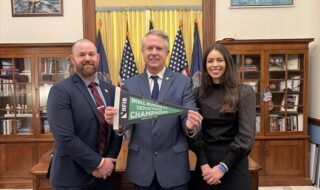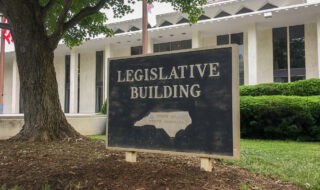January 26, 2021 Last Edit: June 5, 2025
SURVEY: COVID-19 Tax Relief, Health Insurance Penalty Among Top Concerns of NC Small Businesses
Small business owners in the Tar Hill State say they should be allowed to deduct forgiven expenses paid for with Paycheck Protection Program (PPP) loans on their state income taxes.
That’s according to the 2021 NFIB North Carolina member ballot, released today. Unlike other business groups, NFIB’s positions on public policy aren’t determined by a board of directors but are based solely on the position of a majority of its members as determined by its state and federal member ballots.
This year’s state ballot found that 87.5% of those responding believe the General Assembly should conform North Carolina’s tax code with federal law allow allowing the deduction of forgiven expenses. The federal COVID-19 recovery act signed into law last month reversed an IRS ruling and clarified that PPP forgiven expenses are deductible.
“Our members need the legislature to relieve some of the financial pressure bearing down on them by allowing them to deduct costs associated with staying open and keeping people working during the pandemic,” Thompson said.
In response to other questions on this year’s member ballot:
- 85.8% oppose legislation requiring North Carolinians to pay a penalty if they don’t have health insurance.
- 84.4% say the burden of proof in workers’ comp claims should be shifted to employees in cases where an injured worker tests positive for drug or alcohol use or refuses to take a drug or alcohol test.
- 82.3% support a bill to block local governments from mandating certain employee benefits. “Our members believe this is something that should be decided at the state level,” Thompson said. “Otherwise, you end up with a crazy quilt of local rules and regulations that create confusion and additional costs for small businesses that operate in multiple jurisdictions.”
Other issues
Thompson said small business owners also are concerned about efforts to more than double the state minimum wage from $7.25 to $15 an hour. “There’s only so much money in a small business’s budget,” he said. “If owners are forced to double people’s wages, they’re going to have to make up the difference somewhere, either by raising prices and possibly losing customers or by trying to get by with fewer employees.”
In addition, NFIB is calling on lawmakers to approve additional grants for small businesses impacted by the pandemic. “Tourism is the No. 1 industry in our state, and businesses from hotels and restaurants to attractions and souvenir shops are really struggling,” Thompson said. “We’ll be working closely with the House Select Committee on COVID-19 to make sure the General Assembly addresses the needs of both employers and employees.”
NFIB is a member-driven organization advocating on behalf of small and independent businesses nationwide.
Related Articles














